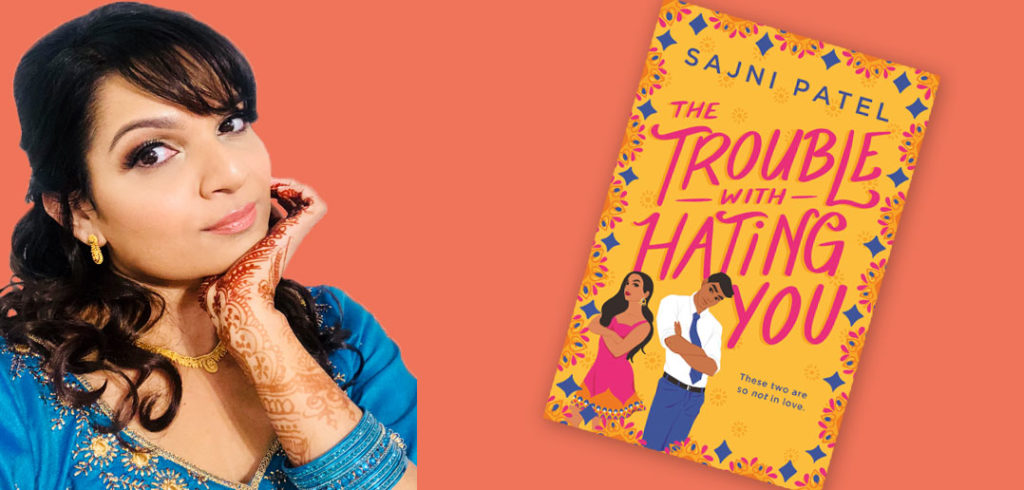Fresh off the release of her debut novel, Sajni Patel talks representation in literature.
By Trinady Joslin, Photo courtesy of Sajni Patel

Sajni Patel’s book The Trouble With Hating You is gaining a lot of attention. Released in May of this year, it landed on Mayor Adler’s 2020 reading list. But it wasn’t an easy road.
The story switches between the perspectives of Liya and her love interest, Jay Shah. This not-so-typical romantic-comedy novel explores Liya’s struggle to fit into her Houston-based Indian community amidst gossip and the presence of her abuser.
Patel spoke with Austin Woman about her growth as a writer, representation in literature and the inspiration behind The Trouble with Hating You.
AW: How much of your personal experience do you draw on when you write? How much of it is entirely fictional?
SP: [The person who sexually assaulted Liya] was based on a real person. In real life, we don’t clash as chaotically as [he]and Liya do. The way her parents treated it and the way the entire community shunned it, that’s definitely fictionalized. But how Liya feels disconnected from her culture and from the community, that’s based on how I feel a lot of the time. I didn’t grow up really connected to the Indian community. I took some deep emotional scars and expanded this whole bubble around it. Like how it feels when someone doesn’t open up to me or respond to me as kindly as they would with someone else who is ‘more religious’ or more involved in the community.
AW: How did it feel to release a book that mirrored a lot of your own experiences?
SP: When I wrote the book, I wrote Liya to be unapologetically herself. She’s very outgoing and opinionated, and she’s a lot of things that I wish I was more like. I let her write herself in the story. I didn’t really have a pathway or a goal in mind. I wanted Liya to just be herself and then see where the story took both of us. As Indians were reading this, I felt very concerned. I didn’t want to offend anyone. It’s kind of a moot point because it’s [my]personal experience … There’s a stigma that goes on with writing a book that’s based on your culture, when it’s non-white. Basically, people have the expectation that you’re going to cover everything in that culture and that you’re going to represent everything in a good light and not have any stereotypes. The reality is my life has a lot of stereotypes. That comes out in the book. I was very nervous with other Indian readers reading the book, but I believe I, for the most part, have received a lot of good reviews. It was nice to hear.
AW: When you write, how much do you think about people expecting you to tackle everything within your culture?
SP: Actually, initially, I started writing stories that were white-centric, because growing up, that’s what I read. Then as I was creating stories, that’s just how the characters would come out. ‘Oh they’re white, because that’s the default; that’s considered normal.’ Then I made the decision to write about Indian main characters with this particular story. There has to be a lot [about]the community just because of the [novel’s] topic itself with arranged marriage and sexual assault. It just ended up being that way. I didn’t want to have, of course, a negative view of everything that’s Indian. But as I write more stories, some of them will have some cultural aspects to it and hit upon different themes and different viewpoints. I don’t believe all of my stories will be cultural. It isn’t my job as an Indian author to try to explain my entire culture to a reader. If a reader wants to know more, they can do their own research, but it is nice to have some cultural facets. You know, as you’re writing a story, you also want readers to see themselves in the books.
AW: What do you want people to take away from The Trouble With
Hating You?
SP: You really shouldn’t judge a person from rumors or gossip. Liya is harsh and she has a lot of gossip around her, and some of it is true. But when you get to know…Liya, you can see that she has a big heart. When she is connected to someone, she’s very loyal to them, like her friend group. One thing I wanted people to take away from [the novel]was yes, you can relate to an Indian character. Chances are if you are Indian, you may not connect to her. The other thing is, of course, the sexual assault. I wanted people to consider their own thoughts and actions if they’ve heard of someone who’s been sexually assaulted. Are they automatically accusing that victim to have brought it upon themselves? Or are they siding with the perpetrator? Are they holding anyone accountable? Or are they in a society that shuns victims and makes it harder for victims to speak up about the truth?
That was one of the other things that I want readers to take away.

